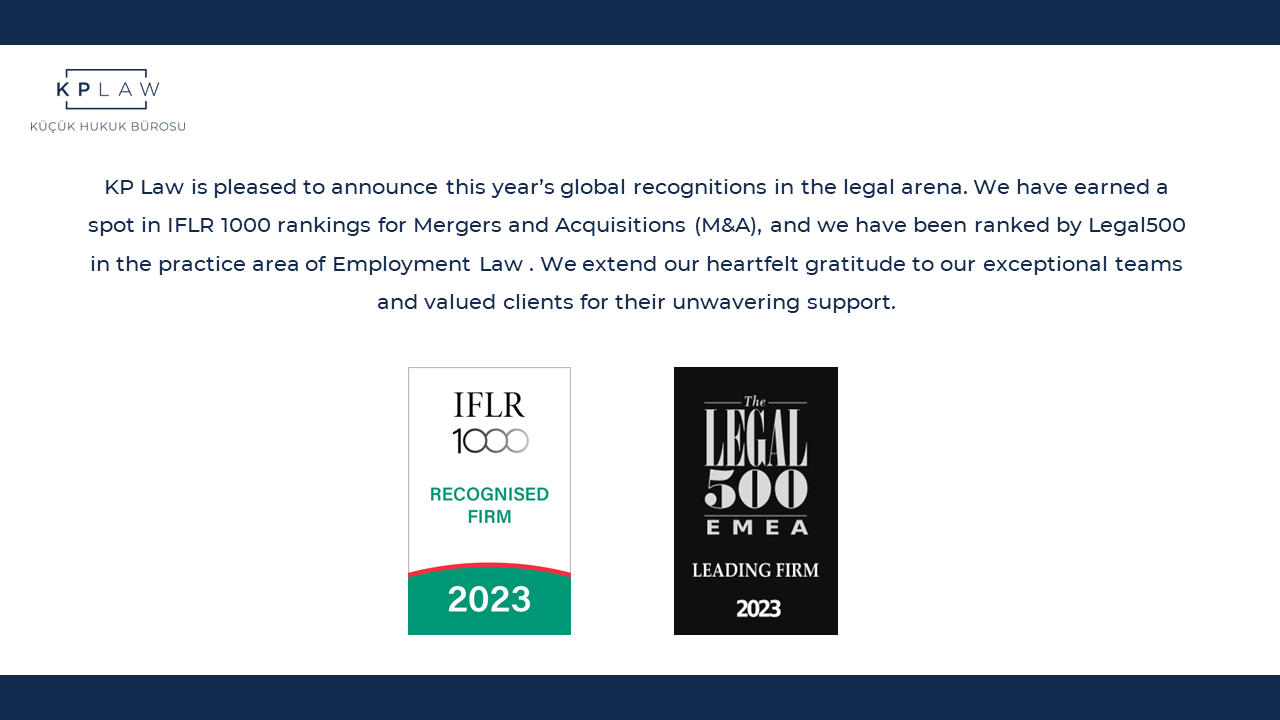News & Insights
European Artificial Intelligence Act Sets Global Regulations
Artificial intelligence has become one of the frequently discussed topics in the global agenda, especially in recent years. The enactment of the Draft AI Act by the European Union will potentially have a crucial impact on the development and use of artificial intelligence and will bring new developments on a global scale. Although Turkey does not yet have a draft legislation specially dedicated to artificial intelligence, it is clear that Turkey will be affected by the European Union’s breakthroughs in this field both in the short and long term.
The Artificial Intelligence Act (“Draft AI Act”) prepared by the European Union was adopted by a large majority of members of the European Parliament's (“Parliament”) Committees on Civil Liberties and Internal Market on May 11, 2023. The next step is its general acceptance by the Parliament.
The Draft AI Act sets out a series of requirements for artificial intelligence systems, including transparency, human oversight, robustness and security, and accuracy, which will have a significant impact on the development and use of artificial intelligence in Europe. These requirements are set to ensure the safe and transparent development and use of artificial intelligence systems.
What Does the Regulation Introduce?
With the Draft AI Act, many issues in terms of artificial intelligence systems are covered by the legal framework. Some of these issues are as follows:
• Risk-Based Approach to Artificial Intelligence - Prohibited Artificial Intelligence Practices
The Draft AI Act categorizes artificial intelligence systems into four categories based on risk levels: unacceptable risk, high risk, limited risk, and minimal risk. According to this classification, the Draft AI Act can apply different rules for artificial intelligence activities. For example, systems that use manipulative techniques intentionally, exploit sensitive points of individuals, and classify people based on their social behaviors, socioeconomic status, and personal characteristics are considered unacceptable risks to people's safety and are prohibited from using such artificial intelligence systems. The Draft AI Act includes the following systems:
- “Real-time” remote biometric identification systems in publicly accessible public spaces.
- Biometric categorization systems that use sensitive features (such as gender, race, ethnic origin, citizenship status, religion, political orientation).
- Predictive systems based on profiling, location and past criminal behavior created by law enforcement with artificial intelligence.
- Emotion-based recognition systems used by law enforcement, border management, workplaces, and educational institutions.
- Systems that randomly collect biometric data through social media or CCTV cameras.
As a result of the meeting they held on May 11, the members of the Parliament decided on the high-risk artificial intelligence systems specified in the Draft AI Act; expanded to include people’s health, safety, fundamental rights and damage to the environment. In addition, the members added artificial intelligence systems produced and used to influence voters in political campaigns, as well as the programs used by social media platforms during these processes, to the high-risk list.
• General Purpose Artificial Intelligence Systems
The original version of the Draft AI Act did not include general-purpose artificial intelligence systems. However, after the universal success of systems like ChatGPT, Bard, and other large language models, it was decided to regulate general-purpose artificial intelligence systems within the Draft AI Act. General-purpose artificial intelligence refers to artificial intelligence systems that are used in various fields and can fulfil various tasks. These AI systems perform functions such as analyzing complex data, making decisions, problem-solving, and automating specific tasks. These systems work using techniques such as deep learning, machine learning, and natural language processing. The Draft AI Act also introduces a number of obligations for general-purpose artificial intelligence systems in order to ensure strong protection of fundamental rights, health and safety, the environment, democracy and the rule of law. For example, these systems must assess potential risks and reduce them as a result of the assessment; they must also be registered in the European Union database.
• Supporting Innovation and Protecting Citizens’ Rights
The Draft AI Act states that the AI Act will not apply to research, testing, and development activities related to an artificial intelligence system before its launch or deployment, on the condition that the activities are carried out in compliance with fundamental rights and relevant European Union laws. The purpose of these exemptions is to support innovation.
• European Artificial Intelligence Board
The Draft AI Act states that each member state will designate a local authority for the implementation and oversight of the Act. In addition to these local authorities, a European Artificial Intelligence Board ("Board") will be established within the European Union. Among the duties of the Board are ensuring cooperation with local authorities and ensuring legal functioning.
Who Will Be Affected and How?
The Draft AI Act, once enacted, will have a significant impact on various stakeholders in the field of artificial intelligence. The companies developing or using artificial intelligence systems stand out as the primary stakeholders affected by the Draft AI Act. These companies are required to conduct risk assessments and take steps to mitigate the identified risks as a result of these assessments. Ensuring transparency and accountability of their systems is also of utmost importance to avoid sanctions. Other stakeholders that may be affected by the AI Act are artificial intelligence system users, non-governmental organizations, public authorities and researchers.
Impact on Turkey and Non-European Union Countries
With the enactment of the Draft AI Act, a new regulatory environment will emerge for artificial intelligence systems in Europe. This will make it more challenging for non-European Union companies to sell their artificial intelligence systems in the European Union market. Moreover, The AI Act will also set a global standard for the regulation of artificial intelligence systems. This will make it more likely that other countries will adopt similar regulations in the field of artificial intelligence. Another benefit of the AI Act is raising awareness about the risks and benefits of artificial intelligence systems. Thus, the systems will carry out their activities in a safe and lawful manner.
There is no legal regulation in the field of artificial intelligence in Turkey yet. However, it was announced in the Official Gazette on 20.08.2021, Turkey will carry out studies within the scope of the National Artificial Intelligence Strategy between 2021-2025, and the relevant institutions and organizations will provide all kinds of support and assistance.
Effective Date
After the approval of the draft by the Civil Liberties and Internal Market committees, it is expected to be generally approved in Parliament in June 2023. Thus, the Draft AI Act will enter the final stage of the legislative process and become an AI Act after the negotiations called trilogues between the European Union Council and the European Commission.
Sanctions
The penalties for non-compliance with legal obligations in the field of artificial intelligence are divided into three main issues:
- In case of non-compliance with the AI Act, administrative fines of up to 6% of the total annual global turnover of the previous financial year or €30 million,
- In case of failure to fulfill the obligations stipulated by the AI Act, administrative fines of up to 4% of the total annual global turnover of the previous financial year or €20 million,
- In case of providing incorrect, incomplete, or misleading information to authorities, administrative fines of up to 2% of the total annual global turnover of the previous financial year or €10 million.
There is no central institution within the European Union for the implementation of these administrative penalties. The Draft AI Act states that whether administrative sanctions are imposed before competent courts or other competent authorities will depend on national legal regulations.

